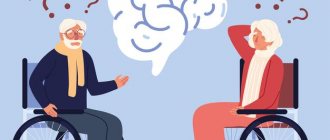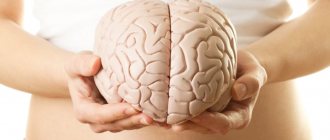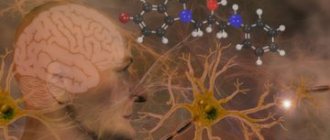Medical information is reliable Checked by Eremin Alexey Valentinovich
As a person ages, cholesterol and blood pressure often increase. As a result, blood circulation in vital organs is disrupted. The central nervous system is especially affected; transient ischemia or stroke results in irreversible changes in the cells. This is how vascular dementia occurs, which is a mental illness. Its main cause is disruption of cerebral blood flow in a certain area and destruction of brain cells due to vascular damage. It is most often observed in the elderly, but can sometimes occur at a young age. According to statistics, pathology occurs more often in men than in women.
What is vascular dementia
If we study the data of foreign scientists, this vascular dementia ranks second in frequency of occurrence after dementia due to Alzheimer's disease. There are different indicators in our country and abroad. Dementia caused by vascular abnormalities is most often recorded in Russia, China and Finland, exceeding Alzheimer's disease in frequency. Often there is a combination of two diseases at once, in this case the deviation is called mixed dementia.
This pathology of vascular origin is a serious medical and social problem. As the average life expectancy of people on earth increases, quite a large number of patients who suffer from dementia turn to doctors, and due to this, its prevalence is increasing. Such patients need not only assistance, but also constant care and monitoring. After detection of vascular dementia, there is a shortening of life and a deterioration in the quality of life in patients. The pathology is treated by a psychiatrist, psychotherapist and neurologist. If necessary, therapists, cardiologists, and others are involved
Recommendations for the patient's loved ones
A person with dementia needs constant care, care and control. It is the responsibility of loved ones to take care of this. To help, you can hire a professional nurse or go to a good boarding house.
- It is necessary to study the nature of the illness of a loved one and prepare for future developments. A person’s disability group is determined and guardianship is arranged.
- Communication with the patient should be simple. You need to speak clearly and clearly, in short phrases. Be prepared to remind and repeat, don't rush or get irritated. Remember that these are not his whims, but the characteristics of dementia.
- Create a calm environment around the patient and make everyday tasks easier for him. Comfortable furniture, high-quality light, and the absence of harsh noise are important.
- It is necessary to monitor the patient’s condition: monitor adherence to the regimen, personal hygiene and medication intake.
- Maintain any useful activity: participation in cleaning, walks, communication, hobbies, etc. Do not force the patient: this can increase depression and apathy.
Social and emotional support is very important for people caring for people with dementia. Caregivers have a 20-30% increased risk of developing the disease. We must not forget about ourselves. Love yourself and take care of yourself too.
Causes of vascular dementia
Before starting treatment for a disease, it is necessary to understand the causes and mechanism of its origin. Vascular dementia occurs as a result of the death of cells in the central nervous system, as they no longer receive nutrients and oxygen. Violation of the blood supply to a certain area is caused by acute and chronic processes, most often the cause is:
- stroke;
- cerebral infarction;
- traumatic brain injury;
- internal intoxication;
- dismetabolic processes;
- brain tumors;
- vasculitis;
- atherosclerosis of cerebral vessels;
- heart disease;
- abnormalities in the structure of arterial walls.
Hemorrhagic stroke, which provokes the appearance of vascular dementia, occurs as a result of hypertension, acute intoxication, and inflammation. Blood pours out from the affected wall and permeates the brain tissue. This process occurs quickly and is accompanied by severe symptoms. If cell death occurs simultaneously, the result is vascular dementia with typical intellectual impairments.
Heredity also plays a role. The likelihood of developing vascular dementia is higher in people whose close relatives suffer from atherosclerosis, coronary artery disease and other pathologies that cause impaired blood flow. It has already been proven that the tendency to lipid metabolism disorders with the formation of sclerotic plaques and coronary heart disease are transmitted genetically. If there are also a number of predisposing factors to the development of vascular dementia:
- alcoholism, smoking, drug use;
- low physical activity;
- diabetes;
- history of mental disorders.
As practice shows, the disease is often multifactorial in origin. Many patients at the time of its manifestation or in history have bad habits, a sedentary lifestyle, and the deposition of atherosclerotic plaques on the inner walls of the arteries.
Causes of development and progression of Alzheimer's disease
Many researchers are trying to figure out why degenerative processes begin in human brain tissue with age. There are three hypotheses explaining the possible causes of the development of this disease:
- The tau hypothesis is one of the youngest ones under study. According to this theory, pathological processes in the brain that lead to the development of dementia are triggered by changes in the structure of the tau protein. First, neurofibrillary tangles form inside the nerve cells, causing a malfunction in the neuron's transport system. Then the transmission of signals between individual cells stops, after which the death of neurons occurs;
- The amyloid hypothesis was discovered relatively recently - it is not yet 30 years old. Accumulations of beta-amyloid were identified as the main cause of the development of degenerative processes. There have been many different studies to support this theory, but a vaccine that can clear protein plaques from the brain is also not effective in treating dementia. Despite the fact that the amyloid theory is accepted as the main one by the scientific community, it does not make it possible to explain all the actions that occur in the human brain during the development of Alzheimer's disease. It is reliably known that a large number of amyloid plaques are not the direct cause of the disease - they only lead to the launch of degenerative operations. What really is the trigger for the onset of beta-amyloid deposition is not yet known;
- The cholinergic hypothesis was accepted immediately after the study of the problem of mental decline in older people began. Its authors believed that pathology develops as a result of a decrease in the synthesis of acetylcholine, which is a neurotransmitter. Over time, this assumption began to be considered unlikely, since drug reduction of acetylcholine deficiency is ineffective in the treatment of Alzheimer's type dementia . However, based on this theory, a large number of maintenance therapy methods have been developed, many of which are successfully used today.
In addition, many researchers believe that excessive sugar consumption can lead to the development of Alzheimer's disease. Glucose blocks the production of an enzyme that is necessary to prevent the development of degenerative processes in brain tissue.
Vascular dementia: symptoms and types
To understand the characteristics of the origin, localization and etiology of the disease, there is a certain classification. In clinical practice, the following types of vascular dementia are distinguished:
- acutely developing (when a heart attack leads to damage to a functionally significant area of the brain);
- multifactorial;
- subcortical (subcortical);
- mixed;
- other types (with hemorrhage, total ischemia, sudden decrease in pressure as a result of cardiac arrest);
- dementia, unspecified.
The chronic form of vascular dementia develops gradually, in stages. Initially, the patient has no cognitive impairment, memory is preserved, and cognitive function deteriorates. The second stage is marked by complaints of memory loss. This manifests itself in the search for familiar objects, since the patient cannot understand where he left them and in forgetting the names of well-known people. Social and professional adaptation, as well as a critical attitude towards one’s condition remains normal.
In the third phase of the disease, cognitive impairment begins to occur:
- loss of orientation in an unfamiliar place;
- inability to retell the text read;
- inability to remember the names of the people presented;
- motivation for professional and other activities decreases or is completely lost;
- deficits in the ability to concentrate are determined by testing;
- the critical attitude towards one’s condition decreases.
The fourth stage corresponds to the concept of mild vascular dementia, when clear symptoms of the disorder appear. During this period, a person:
- information about current events is lost;
- there is some memory deficit;
- lack of concentration;
- there is an inability to move independently without the risk of getting lost.
Some patients with vascular dementia may retain the ability to navigate time and place and recognize familiar people. However, complex tasks are beyond their capabilities. As a mechanism of psychological defense, there is a lack of a critical attitude towards one’s condition.
With moderate dementia, which corresponds to the fifth stage of the disease, the patient already needs help. In a conversation, he cannot remember his address, phone number, or names of family members. Discoordination in time and space is often observed. However, many important facts are still retained in a person’s memory. He usually knows his name, retains the ability to care for himself, and can cook and eat food.
The transition to the sixth stage marks the symptoms of severe vascular dementia. There is a man with her:
- unable to remember spouse's name;
- loses the sequence of events in his life;
- they don’t understand what month, season, day of the week, date, year it is;
- have difficulty counting from one to ten and back;
- needs help with daily living.
Particularly characteristic of severe dementia are changes in the patient’s personality and emotional state. Such violations are varied and include:
- psychotic disorders (conversations with a reflection in the mirror, accusing loved ones of impostor, etc.);
- obsessive rituals (frequently performing the same actions);
- anxiety, hyperarousal, unjustified aggression;
- inability to make volitional decisions and actions.
Vascular dementia in the last stage manifests itself in a complete loss of the ability to communicate, often the person simply remains silent. Some may speak out, but their speech loses all meaning and logic. The ability to move independently is gradually lost, and urinary incontinence is observed. When assessing the neurological status, increased muscle tone and the appearance of pathological reflexes are noted.
In vascular dementia after a stroke, the nature and severity of the disorders are determined by the affected area.
Caring for a person with dementia
Having a relative with advanced dementia is a real challenge. The behavior and well-being of the patient depends on the behavior of the people around him, which is why it is important to devote a sufficient amount of time to care. To maintain a relatively stable patient's condition, it is recommended:
- organize a clear, understandable and stable daily routine;
- involve a person in family life and communication as much as possible;
- constantly stimulate thinking: solve crosswords, play chess, read and discuss what you read;
- give small tasks around the house so that the patient feels important and useful;
- avoid conflicts, violence, bullying, and excessive care.
As dementia progresses, it is recommended to make your home as safe as possible by removing any dangerous objects and securing heavy furniture. The patient needs constant observation and control, since he can harm himself or get lost simply by leaving the house. Severe degrees require constant care: feeding, hygiene procedures.
How is vascular dementia confirmed?
Vascular dementia is accompanied by a decrease in the functions of the brain centers compared to the initial level, before the development of the disease, which leads to disruption of activity in communication and daily activities. In this case, deviations should not be associated with specific somatic problems and neurological deficits.
To establish a diagnosis of vascular dementia, it is necessary to take into account clinical symptoms, anamnesis, examination results, and the nature of the development of the disease. Its mandatory criteria are:
- cognitive impairment (memory disorder, lack of purpose, ability to abstract, plan);
- instrumentally confirmed fact of cerebral circulation pathology using CT, MRI and deviations in neurological status.
When examined by a neurologist, the following should be present or indicated in the medical history:
- paresis of half the body;
- decreased tone of the lower facial muscles;
- positive Babinski sign;
- impaired skin sensitivity;
- symptoms of damage to the extrapyramidal zone (if there is a lesion in it);
- inability to maintain balance, changes in gait;
- dysarthria.
Additional (secondary) signs of vascular dementia are:
- isolated cases of impaired range of active movements, coordination, asymmetry of reflexes, and other signs of pyramidal insufficiency;
- ataxia and other abnormalities while walking;
- history of frequent falls due to postural instability;
- changes in frequency of urination, urge without the presence of urological pathology;
- speech and swallowing disorders;
- depression, emotional instability, lethargy.
To clarify the diagnosis of vascular dementia, a person is consulted by a neurologist, cardiologist and psychiatrist. Sometimes communication with other specialists is required. It is important to differentiate it from Alzheimer's disease, which is accompanied by similar clinical symptoms. To do this, you need to pay attention to objective analysis data. The following signs should be considered in favor of a vascular origin:
- began acutely;
- accompanied by transient disturbances of cerebral blood flow;
- transient neurological disorders or short-term stupefaction were observed;
- the dementia clinic began in stages;
- the strength and severity of symptoms changed over a short period of time.
If there are also signs of local damage during brain examination, vascular disease and focal neurological symptoms, then it can almost certainly be stated that the patient has vascular dementia.
You should not make a diagnosis yourself, much less give potent drugs. Only a specialist with extensive experience, based on the studies performed, can determine vascular dementia.
Prevention
Prevention of dementia helps not only to prevent the development of this pathology, but also to slow down the progression of the process that has already begun. Doctors recommend:
- be promptly examined and treated as necessary;
- avoid excess body weight;
- stop smoking and drinking alcohol;
- regularly engage in amateur sports to maintain tone (walking, swimming, yoga, etc.);
- eat properly and balanced, drink enough clean water;
- avoid stress, physical and mental fatigue;
- engage in mental work regularly.
Vascular dementia: treatment in Moscow
Vascular dementia requires immediate treatment as soon as it is detected. It is carried out both on an outpatient basis and in a hospital. Dr. Isaev’s psychiatric clinic uses only certified and proven medications to eliminate the cause and relieve the symptoms of the disease.
Indications for hospitalization of a patient are:
- psychopathological deviations that cannot be stopped at home;
- a person’s behavior poses a threat to himself and others (aggression, attack, suicide attempts);
- complete helplessness of the patient, inability to care for himself;
- the need for psychiatric care, without which significant harm to health can be caused.
For this pathology, psychiatric care includes eliminating the influence of the causative factor (vasculitis, hypertension, stroke, atherosclerosis), improving cerebral blood flow and brain cell metabolism. For this diagnosis the following are used:
- anticoagulants and antiplatelet agents to improve blood rheology;
- antihypertensive drugs for high blood pressure to prevent recurrent stroke;
- antioxidants, nootropics (help restore damaged brain cells and reduce their sensitivity to ischemia);
- vasoactive drugs and nicotinic acid (expand the vascular bed and increase the flow of oxygen to the tissues of the central nervous system);
- cholinesterase inhibitors (act on the pathogenesis of the disease);
- statins (reduce cholesterol levels in the blood, prevent the deposition of plaques on the intima of blood vessels);
There are also studies on the use of antidepressants to treat depression in vascular dementia. If psychotic abnormalities appear, the doctor may prescribe antipsychotics and tranquilizers, mood stabilizers, and sleeping pills. Drug treatment of aggression, mental disorders and correction of patient behavior is carried out through the use of small antipsychotics, which are safer for older people. They are given in minimal doses and in short courses.
People with vascular dementia often experience paradoxical reactions to medications. Therefore, during the period of their prescription, constant monitoring of the characteristics of their effect on a person is required, with a change in the drug in the absence of effectiveness or the development of negative symptoms. All drugs that can impair cognitive functions are not used, or are given in a minimal dose for a short course. Drug therapy for this disease is the main one, but it is successfully supplemented with psychotherapy, occupational therapy, and skilled nursing.
Dementia atherosclerotic, senile
Dementia
- translated from Lat. dementia means insanity - a serious disease caused by organic damage to the brain, expressed in a sharp decrease in mental abilities, collapse of mental functions, irreversible loss of acquired knowledge and skills, decreased ability to self-care, persistent decrease in the speed of mental reactions, impoverishment of emotions, impaired emotional control, motivation and social behavior.
The clinical picture of dementia is characterized by the causes that caused organic brain damage, the localization and extent of the defect, and the initial state of the body. But in all cases of the disease, memory impairment, attention disorders, decreased thinking and learning abilities, and loss of basic skills are characteristic. Dementia is an irreversible degenerative disease, and at a young age its development occurs as a result of addictive behavior from addictions - alcohol addiction. Senile dementia - translated from Latin. senilis means senile - is colloquially called senile marasmus and develops in people after 65 years of age.
According to WHO, there are more than 47 million people with dementia in the world and more than 7 million new cases of the disease are registered annually.
Get a free consultation by phone
Help from a psychologist for vascular dementia
Help from a psychologist for vascular dementia is a necessary component of effective therapy. Our specialists also work with people who are forced to care for such patients, as they are constantly under adverse influences and experience distress.
There is no such practice in public hospitals, since most often elderly people who have no social significance suffer from dementia. Therefore, municipal institutions are designed primarily to maintain the vital functions of the patient’s body and care, which also leaves much to be desired.
Scientists have proven in numerous studies that in the early stages of the disease, working with a psychologist can effectively maintain a satisfactory state. Typically, the following psychotherapy techniques are best suited for this purpose:
- cognitive-behavioural;
- interpersonal;
- analytical;
- psychodynamic.
Such assistance for vascular dementia is necessary for quality treatment. Many people with this disease are capable of active communication with a specialist at an early stage; they want to preserve their identity and understand what is happening to them. Supportive conversations allow them to adapt to their condition and accept it without unnecessary fear and anxiety, which further aggravate the situation. Some experts consider it inappropriate to inform a person about the diagnosis. But according to surveys and studies, most patients would like to have a more complete understanding of their problem and how to solve it.
The use of supportive psychotherapy, as practice shows, has a very positive effect on the quality of life of a person with vascular dementia. Essentially, this technique involves the psychologist providing attention, support and encouragement to the patient. At the same time, methods are used to stimulate brain function and normalize emotional manifestations. The specialist gives advice, convinces, encourages, and, if necessary, retrains the person. The emphasis of the work is on caring and understanding rather than suppression. After proper psychotherapy, you can get the following results:
- partial restoration of lost skills and functions;
- social and psychological adaptation of the patient;
- restoration of the ability to cope with difficulties;
- increasing self-esteem and self-confidence;
- knowledge of who to turn to for help in difficult times.
Psychological assistance is also necessary for the patient’s relatives who are nearby and care for him. A psychotherapist and psychiatrist explain the nature of the disease and provide basic knowledge about it, so as not to confuse manifestations of bad character with pathological disorders. Many find it difficult to come to terms with the fact that their mother, father, grandmother or grandfather becomes capricious, aggressive, and begins to say unpleasant things to them. The doctor’s task is to help survive such stress and give strength for care and optimal communication with the patient.
To prevent a nervous breakdown, the patient’s relatives need to:
- alternate between caring for a loved one and proper rest;
- periodically change the environment (mind your own business, go out into nature, communicate with friends);
- learn to completely switch your attention from the patient’s problems to positive things (communication with other family members, watching entertaining TV shows, reading books, physical exercise).
The behavior of loved ones is very important for a person with vascular dementia; the duration of the patient’s active life depends on their attitude. Psychological assistance from relatives includes the following:
- constantly explain and give advice;
- empathize and sympathize;
- encourage, teach, give incentive to action;
- constantly praise;
- increase the patient's self-esteem;
- inspire positive thoughts and hope for recovery;
- help solve problems;
- create a friendly atmosphere in the house.
It is important that relatives of a patient suffering from vascular dementia treat him with understanding. They should see a person in front of them, not a problem. If this principle is followed, then such an attitude will help him strengthen his strength, improve his skills and overcome difficulties, which, in turn, will make the task of his loved ones easier.
Diagnostics
To make a diagnosis, doctors at the Leto Mental Health Center use a variety of tests and techniques to assess cognitive function. In addition, the following studies are required:
- CT and/or MRI of the brain (if necessary, with contrast);
- Dopplerography and ultrasound;
- analysis for biomarkers of hereditary forms of senile dementia (Alzheimer's, Huntington's, etc.);
- assessment of vitamin levels, hormonal levels, metabolism;
- ECG, EchoCG, etc.
Consultations with related specialists to assess general health are also indicated.
Questions and answers
What are the ways to prevent vascular dementia?
To prevent the formation of vascular dementia, it is useful to take vitamins and substances with antioxidant properties. These include vitamin E, C, and all types of polyunsaturated fatty acids. It is necessary to monitor sufficient levels of B12 and folic acid, and exclude foods high in cholesterol from the menu.
Can dementia be cured?
Vascular dementia cannot be completely cured. But with the right approach to therapy, it is possible to increase the patient’s life and activity.
What are the complications of dementia?
Complications are observed in severe stages of this disease and in the absence of complex therapy. A person completely loses social adaptation and ability to work, and injuries may occur due to ataxia. The main diseases that lead to brain pathology are getting worse - diabetes, hypertension, atherosclerosis.
Clinical course and prognosis
The clinical course and prognosis of the disease is influenced by the cause that caused pathological changes in the central nervous system. For example, in post-traumatic dementia, when the underlying disease is not prone to development, with adequate treatment, significant improvements are possible as a result of developing compensatory reactions. When other, unaffected areas of the cerebral cortex will be able to take over some of the functions. Alzheimer's disease and vascular dementia are among the most common types of steadily progressive dementia. Treatment of these diseases is only the removal of unpleasant symptoms, slowing down the disease process, social and personal adaptation of patients, and prolonging their life. With a rapidly progressing disease that causes dementia, the prognosis is unfavorable. The patient dies several years, sometimes months, after the first symptoms of the disease appear. Death is usually caused by concomitant diseases, such as pneumonia, sepsis, which develop against the background of damage to the central regulation of human systems and organs.







